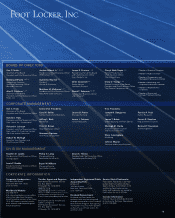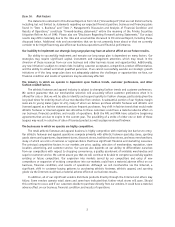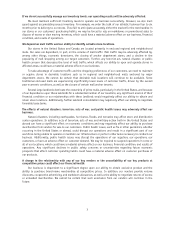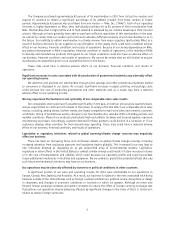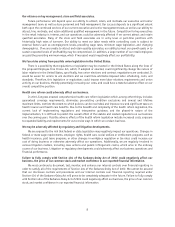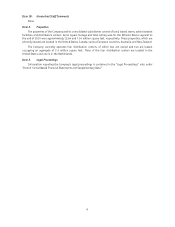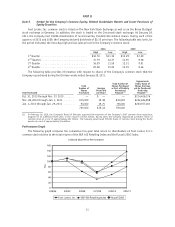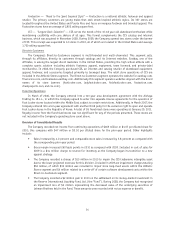Foot Locker 2010 Annual Report Download - page 24
Download and view the complete annual report
Please find page 24 of the 2010 Foot Locker annual report below. You can navigate through the pages in the report by either clicking on the pages listed below, or by using the keyword search tool below to find specific information within the annual report.In addition, because we and our suppliers have a substantial amount of our products manufactured in
foreign countries, our ability to obtain sufficient quantities of merchandise on favorable terms may be affected
by governmental regulations, trade restrictions, and economic, labor, and other conditions in the countries from
which our suppliers obtain their product.
We operate in many different jurisdictions and we could be adversely affected by violations of the U.S.
Foreign Corrupt Practices Act and similar worldwide anti-corruption laws.
The U.S. Foreign Corrupt Practices Act (‘‘FCPA’’) and similar worldwide anti-corruption laws, including the
U.K. Bribery Act of 2010, which it is anticipated will become effective in 2011 and is broader in scope than the
FCPA, generally prohibit companies and their intermediaries from making improper payments to non-U.S. officials
for the purpose of obtaining or retaining business. Our internal policies mandate compliance with these
anti-corruption laws. Despite our training and compliance programs, we cannot be assured that our internal
control policies and procedures will always protect us from reckless or criminal acts committed by our employees
or agents. Our continued expansion outside the U.S., including in developing countries, could increase the risk of
such violations in the future. Violations of these laws, or allegations of such violations, could disrupt our
business and result in a material adverse effect on our results of operations or financial condition.
The current global economic conditions have adversely affected, and may continue to adversely affect our
business and results of operations.
The Company’s performance is subject to global economic conditions and the related impact on consumer
spending levels. Some of the factors affecting consumer spending are employment, levels of consumer debt,
reductions in net worth as a result of market declines, residential real estate and mortgage markets, taxation, fuel
and energy prices, interest rates, and consumer confidence, as well as other macroeconomic factors. Consumer
purchases of discretionary items, including merchandise we sell, generally decline during recessionary periods
and other periods where disposable income is adversely affected and customers may be hesitant to use available
credit. The downturn in the global economy may continue to affect customer purchases for the foreseeable future
and may adversely impact our business, financial condition, and results of operations. In addition, declines in our
profitability could result in a charge to earnings for the impairment of long-lived assets, goodwill and other
intangible assets, which would not affect our cash flow but could decrease our earnings, and our stock price could
be adversely affected.
Instability in the financial markets may adversely affect our business.
Uncertain economic conditions may constrain our ability to obtain credit. Domestic and global credit and
equity markets have recently undergone significant disruption, making it difficult for many businesses to obtain
financing on acceptable terms or at all. Although we currently have a revolving credit agreement in place until
2013 and do not have any borrowings under it (other than amounts used for standby letters of credit), tightening
of credit markets could make it more difficult for us to access funds, refinance our existing indebtedness, enter
into agreements for new indebtedness or obtain funding through the issuance of the Company’s securities.
Additionally, our borrowing costs can be affected by independent rating agencies’ ratings, which are based largely
on our performance as measured by credit metrics, including lease-adjusted leverage ratios.
In addition, instability in the financial markets may have a negative effect on businesses around the world,
and the impact on our major suppliers cannot be predicted. The Company relies on a few key vendors for a
majority of its merchandise purchases (including a significant portion from one key vendor). The inability of key
suppliers to access liquidity, or the insolvency of key suppliers, could lead to their failure to deliver our
merchandise. Our inability to obtain merchandise in a timely manner from major suppliers could have a material
adverse effect on our business, financial condition, and results of operations.
5



